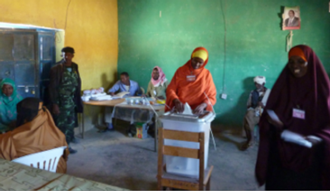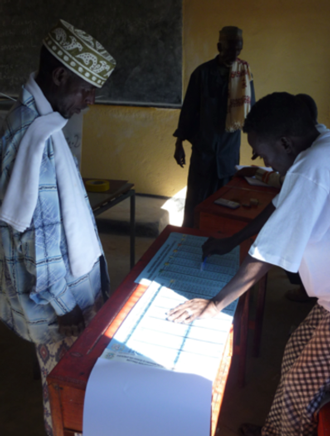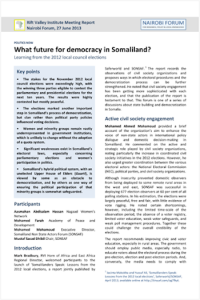Key points
-
The stakes for the November 2012 local council elections were exceedingly high, with the winning three parties eligible to contest the parliamentary and presidential elections for the next ten years. The results were highly contested but mostly peaceful.
-
The elections marked another important step in Somaliland’s process of democratization, but clan rather than political party policies influenced voting decisions.
-
Women and minority groups remain vastly underrepresented in government institutions, which is unlikely to change without the adoption of a quota system.
-
Significant weaknesses exist in Somaliland’s electoral laws, especially concerning parliamentary elections and women’s participation in politics.
-
Somaliland’s hybrid political system, with an unelected Upper House of Elders (Guurti), is viewed by some as an obstacle to democratization, and by others as one way of ensuring the political participation of that minority groups is somewhat safeguarded.
Participants
Aasmahan Abdisalam Hassan, Nagaad Women’s Network
Mohamed Farah, Academy of Peace and Development
Mohamed Mohamoud, Executive Director, Somaliland Non State Actors Forum (SONSAF)
Mustaf Sacad Dhibil, Chair, SONSAF
Introduction
Mark Bradbury, RVI Horn of Africa and East Africa Regional Director, welcomed participants to the launch of Somalilanders Speak: Lessons from the 2012 local elections, a report jointly published by Saferworld and SONSAF.[1] The report records the observations of civil society organizations and proposes ways in which electoral procedures and the democratization process can be further strengthened. He noted that civil society engagement has been getting more sophisticated with each election, and that the publication of the report is testament to that. This forum is one of a series of discussions about state building and democratization in Somalia.
Active civil society engagement
Mohamed Ahmed Mohamoud provided a brief account of the organization’s aim to enhance the voice of non-state actors in international policy dialogue and domestic decision-making in Somaliland. He commented on the active and strategic role played by civil society organizations, noting particularly the increase in coordinated civil society initiatives in the 2012 elections. However, he also urged greater coordination between the various electoral actors: the National Electoral Commission (NEC), political parties, and civil society organizations.
Although insecurity prevented domestic observers from being deployed to some remote rural areas in the west and east, SONSAF was successful in deploying 677 election observers at 60 per cent of all polling stations. In his estimation, the elections were largely peaceful, free and fair, with little evidence of vote rigging. He noted certain shortcomings, however, including the limited time-scale of the observation period, the absence of a voter registry, limited voter education, weak voter safeguards, and weak poll management procedures. Together these could challenge the overall credibility of the elections.
The report recommends improving civic and voter education, especially in rural areas. The government should employ public media, especially radio, to educate voters about the electoral process during the pre-election, election and post-election periods. And, conversely, the media needs to comply with principles of neutrality and impartiality before, during, and after the elections.
The Code of Conduct agreed between the parties on the conduct of the elections was a particular achievement for Somaliland. But there were substantial problems with enforcing it during the elections, and ensuring that all domestic observers and political parties operated within the law. The report recommends that the political parties should clearly state their commitment to the electoral code of conduct and improve their basic knowledge of electoral laws. The report further argues that political parties should distance themselves from clan politics and endorse a distinct party platform.
He provided a list of further recommendations made in the joint Saferworld/SONSAF report. First and foremost, he stressed the importance of registering voters and distributing identity cards, in order to avoid double and underage voting, and contribute to the overall credibility of the electoral process. He suggested that parliament draft legislation criminalizing such voting malpractices. In addition, the government needs to ensure that there are proper conflict resolution mechanisms to deal with election complaints at the national, regional and district level.
The NEC faced numerous challenges during the elections: they were unprepared for the numerous logistical and technical glitches resulting from the substantial increase in the number of political associations and registered candidates. Before the next elections, he recommended that the NEC ensure that polling centres are clearly demarcated, so that NEC staff and domestic observers can be deployed to polling centres without difficulty or delay. NEC staff should also undergo more in-depth training, including specific instruction on data entry and back–up systems to avoid the loss of key data. Enhancing confidence in the electoral process among political parties and the general public will also be a crucial task for the NEC.
The report recommends that the NEC should also develop a strategy to improve the participation of women in future elections, and lobby parliament to adopt legislation on a quota for women MPs. It is necessary for the NEC to encourage women’s mobilization and solidarity at the grassroots level.
Ahead of the next elections, SONSAF will establish a democratization working group consisting of civil society groups, which will undertake policy advocacy, focusing on the implementation of electoral law reforms, women and minority quota issues, parliamentary elections, the establishment of a credible voter registration system, and a general promotion of civic participation and dialogue on the future of democracy in Somaliland.
Participation and representation of women in decision-making
Aasmahan Abdisalam Hassan provided a summary of women’s participation in Somaliland politics. Since no national census has ever been conducted, the size of Somaliland’s female population is unknown. However, various studies estimate that women comprise the majority, and women have constituted more than 60 per cent of the eligible voting population. She applauded women’s active participation as voters, but challenged the lack of solidarity between women voters and female candidates.
She discussed the significant cultural and religious limitations for women’s political participation. In Somalia’s traditional patriarchal society there is little room for women in key decision-making roles. She is optimistic, however, that the move from a clan-based to multi-party system is already bringing, and will continue to bring, opportunities for women.
 The constitution’s ambiguity on the issue of women’s rights has left people unclear about the role of women in politics. While Article 22 specifically states ‘that every citizen shall have the right to participate in political … affairs in accordance with the law and constitution’, Article 36 (1) clarifies that ‘the rights, freedoms and duties laid down in the constitution are to be enjoyed equally by men and women, save for matters which are specifically ordained in Islamic Sharia’. She cited Jamal Badawi’s ‘The Status of Women in Islam’, which contends that women’s right to political participation is ‘respected and guaranteed in Islam’.[2] This might be the case in theory, but in reality, the male-dominated clan system continues to impede women’s political participation in Somaliland.
The constitution’s ambiguity on the issue of women’s rights has left people unclear about the role of women in politics. While Article 22 specifically states ‘that every citizen shall have the right to participate in political … affairs in accordance with the law and constitution’, Article 36 (1) clarifies that ‘the rights, freedoms and duties laid down in the constitution are to be enjoyed equally by men and women, save for matters which are specifically ordained in Islamic Sharia’. She cited Jamal Badawi’s ‘The Status of Women in Islam’, which contends that women’s right to political participation is ‘respected and guaranteed in Islam’.[2] This might be the case in theory, but in reality, the male-dominated clan system continues to impede women’s political participation in Somaliland.
She noted that it is hard to discuss equal representation at all levels of government, when the current NEC is entirely male. She urged that a quota system be adopted for women in political institutions but also in civil society.
She then provided an overview of women’s participation in past elections. In 2005, while seven women candidates competed with 239 male candidates for 82 parliamentary seats, only two women managed to secure seats. She argued that financial constraints—exacerbated by cultural restraints and a general reluctance among even the female voting population to vote for women—have prevented women from assuming a more visible presence in politics.
Furthermore, women have rarely secured cabinet positions. In the previous Somaliland government, headed by President Dahir Riyale Kahin, two women served as ministers: one as Minister of Family and Social Affairs, and one as the Minister of Foreign Affairs. The latter was subsequently replaced by a man.
During the 2010 presidential campaign, the current ruling party – Kulmiye – promised to allocate 25 per cent of positions to women if it won the election. When Kulmiye came to power, three women (two ministers and one vice-minister) were included in the cabinet. A woman was also appointed to chair the Human Rights Commission and another was nominated as the head of the Humanitarian Office of the Presidency. Yet these nominations still did not fulfil the 25 per cent quota promised by the party in its campaign. In the government’s March 2012 reshuffle—a practice that in itself often negatively affects women—one of the female ministers, the Minister of Labour and Social Affairs, lost her post and was replaced by a male minister.
In 2011, Nagaad Network lobbied for a 25 per cent quota for women at all levels of government. In April that year, the Social Affairs Committee of the House of Representatives, referring to Article 22 (a) of the Constitution, passed by simple majority a motion to reserve seats for women and minority clans in the local council elections. Unfortunately, the House of Elders (Guurti) rejected it on the basis that the constitution does not endorse a quota for ‘special groups’. Nagaad appealed the decision.
In 2012, a National Consultative Committee advised President Silanyo to implement a 15 per cent quota for women in local councils, a 10 per cent quota for women in the House of Representatives, and a 7 per cent quota in the Guurti itself, if it were to become an elected body. If the Guurti remains a House of unelected elders, then women would not be represented.
On 12 July 2012, the draft law on women’s quota was brought before the House of Representatives but a majority of MPs rejected the draft motion on technical grounds, deciding to return it to the advisory subcommittee of the House.
Despite disappointment at the rejection of the proposed quota, the November elections have given Nagaad and other organizations a renewed determination to push for the adoption of a women’s quota in all Somaliland’s political institutions.
In the November 2012 local council elections, 142 women contested seats, resulting in a 400 per cent increase in the number of elected female councillors. In reality, however, this meant that women secured only 10 out of 379 seats. Financial and cultural constraints still remain substantial obstacles to women’s political upward mobility.
A few positive developments since the elections point to a possible change on the horizon. On 30 January 2013, President Ahmed Mahamoud ‘Silanyo’ reiterated his support for the quota law before the two houses, urging elected officials to reconsider their position and pass the law. On 25 June 2013, in a subsequent cabinet reshuffle, the President nominated a woman as Minister of Environment, and another woman as Vice-Minister in the Ministry of Labour and Social Affairs. While Asmahan is optimistic that significant progress is imminent, she realizes that forces wishing to maintain the status quo will remain a significant obstacle.
Mustaf Sacad Dhibil reported on a recent conversation he had with NEC representatives. He pointed out that the NEC is currently trying to convince the government that voter registration cannot be completed in the next two years, i.e. before the 2015 parliamentary elections. So if a complete voter registry remains a precondition for holding the next elections, there will certainly be further postponements. The NEC plans to meet with political parties and government to prioritise issues that need to be addressed in the next two years.
Guurti impeding democratization?
Mohamed Farah discussed minority representation and the implications of retaining the Guurti for Somaliland’s democratization process. He noted that, in the last 20 years, Somaliland’s hybrid political system—the fusion of a modern parliamentary House of Representatives with a traditional political system—has worked reasonably well.
 He contended that since Somaliland’s democracy is still in its infancy, the Guurti is necessary to maintain social cohesion and act as a safeguard against the marginalization of minority clans. In the 2005 parliamentary elections, minority clans lost their representation almost entirely in the House of Representatives. In his estimation, instead of crippling the democratization process, the Guurti eases the country’s transition to democracy while protecting the rights of minority groups.
He contended that since Somaliland’s democracy is still in its infancy, the Guurti is necessary to maintain social cohesion and act as a safeguard against the marginalization of minority clans. In the 2005 parliamentary elections, minority clans lost their representation almost entirely in the House of Representatives. In his estimation, instead of crippling the democratization process, the Guurti eases the country’s transition to democracy while protecting the rights of minority groups.
Mohamed’s biggest concern is not whether the Guurti’s term should be extended, but whether its members should be popularly elected or selected by clans, an element left unclear in the 2001 constitution. The Guurti remains the only unelected representative institution in Somaliland. Some of its current members have inherited their seats from deceased relatives. Many have served since the 1993 Borama conference, which is described by some Somalis as antithetical to democracy. Its six-year term has expired many times—and has been unilaterally extended twice by the elders.
He recognized the unwieldy nature of the Guurti’s legislative mandate, and its ability to extend a president’s term unilaterally. He therefore proposes a constitutional review process to determine a more clearly defined political role for the Guurti.
In terms of the elections, he voiced particular concern over the switch from a closed to open list system of party repesentatives. While, in theory, open lists increase transparency, he argued that it could have a negative affect on minority groups, boosting clan politics in Somaliland and increasing the likelihood that individuals will vote along clan and sub-clan lines rather than according to political party ideology. While in most democratic countries, an open list endorses independents, in Somaliland candidacy still remains closely linked to one’s ability to rally clan support.
Discussion
Mark Bradbury asked the panellists whether international funding could have been better spent or spent differently, given the challenges that remain with electoral politics in Somaliland. Since the first district council elections in 2002 funding has increased substantially. The panellists generally agreed that international funds had been well spent.
Ulf Terlinden, Somali Country Director of Interpeace, suggested that it would be a misconception to see the Somaliland elections as completely dependent on international funding. The country’s first elections were conducted reasonably well with very little donor funding, because of the international community’s unwillingness to deal with an independent Somaliland. He argued that international funding plays a crucial role in Somaliland elections, primarily because it is perceived as a safeguard against political and/or governmental interference.
He also recommended combining parliamentary and presidential elections in 2015, which would allow the government to save at least $4 million, which could be used to develop a civil/voter registry.
Notes
[1] Jacinta Makokha and Yussuf Ali, ‘Somalilanders Speak: Lessons from the 2012 local elections’, Saferworld/SONSAF, April 2013; available online at http://tinyurl.com/og7fkyt.
[2] Jamal A. Badawi, ‘The Status of Women in Islam’, al-lttihad 8/2 (1971); available online at http://tinyurl.com/kg4bfrj.




